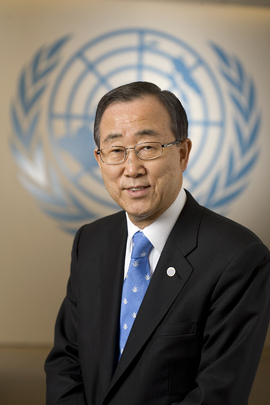LOC09:17
06:17 GMT
 Secretary-General Ban Ki-moon
Secretary-General Ban Ki-moon
UNITED NATIONS, Feb 9 (KUNA) -- Secretary-General Ban Ki-moon late
Wednesday said he will discuss with his Arab League (AL) counterpart Nabil
Al-Araby the latter's proposal to send a joint AL-UN observer mission and a
joint special envoy to Syria, warning that the situation in the strife-torn
country will only get worse and that the crisis will inevitably engulf the
region.
"He (Al-Araby) informed me (by phone) that he intends to send the Arab
League observer mission back to Syria and asked for UN help. He further
suggested that we consider a joint observer mission in Syria, including a
joint special envoy," Ban told reporters following a private briefing to the
Security Council on his latest trip to the Middle East and Africa.
"No detailed discussions have taken place yet. We will have to discuss (the
details) with the Arab League," Ban said, adding that he was not sure whether
Syrian President Assad would accept such a mission or envoy.
"It is not clear. We will have to see," he said in answer to questions.
He said many Council members expressed their views about the AL proposals.
"In the coming days, we will further consult the Council before fleshing
out details," he said, adding, "we stand ready to assist in any way that will
contribute towards improvement on the ground and to the overall situation."
The AL sent its observer mission to Syria in late December, but had to
suspend its work in late January because of the security situation in the
country. Since then, the countries forming the Gulf Cooperation Council (GCC),
as well as Jordan and Morocco, pulled their observers from Syria all together.
Ban did not hide his outrage at the situation in Syria, particularly in
Homs, and his fear of its effect on the region.
"I fear that the appalling brutality we are witnessing in Homs, with heavy
weapons firing into civilian neighbourhoods, is a grim harbinger of worse to
come," he warned. "I am convinced that the deteriorating situation in Syria
will not leave the rest of the region untouched."
Ban also criticized Russia and China which vetoed a Council resolution last
Saturday which would have backed an AL plan for a peaceful political
transition in Syria.
"I deeply regret that the Security Council has been unable to speak with
one clear voice to end the bloodshed ... For too many months, we have watched
this crisis deepen. We have seen escalating violence, brutal crackdowns, and
tremendous suffering by the Syrian people," he said.
The Council's "failure to do so is disastrous for the people of Syria. It
has encouraged the Syrian government to step up its war on its own people.
Thousands have been killed in cold blood, shredding President Assad's claims
to speak for the Syrian people."
"Such violence is unacceptable before humanity," Ban said. "How many deaths
will it take to halt this dangerous slide toward civil war and sectarian
strife? How many more people will have to die before a political solution
comes out?" he wondered, adding that President Assad "should be responsible
for all this. I am urging that this should be stopped immediately."
"If this killing continues, it will only erode his legitimacy as leader of
Syria. I have been repeatedly saying that he's losing legitimacy as the leader
of Syria. Therefore, it is important to take bold and decisive measures," he
stressed.
"Any moment is important to end violence and to have political
negotiations, for him to take decisive decisions; to, first of all,
immediately end violence. At this time, I would like to urge all parties to
end the violence and engage in political negotiation on this matter," he urged.
At this moment of such "grave consequence," Ban argued, it is "more urgent
than ever to find common ground. We have heard too many broken promises, even
within the past 24 hours."
Close to 6,000 civilians were killed since pro-democracy protestors took to
the streets in mid-March calling for an end to the Assad regime.
On his trip to Israel, the West Bank, and Gaza, Ban said there is
"considerable frustration and skepticism on both sides. Time is not on the
side of either party."
"The situation is not favourable and it seems that the parties are still
just taking 'wait and see' positions, considering all that is happening in the
region. But I urged them that, while the situation may look fragile and
volatile in the region, this is the right moment to enter into negotiations to
promote peace and stability in the region," he said.
He urged both Palestinian President Mahmoud Abbas and Israeli Prime
Minister Benjamin Netanyahu to recognize the "need to rebuild momentum" and
"not to miss the opportunity" offered by the Jordanian king to resume their
negotiations which took place during the month of January, but to no avail.
"Goodwill gestures and positive facts on the ground will go a long way
toward setting the stage for progress in the negotiations," he noted.
Ban reiterated his position that the Palestinian Fatah-Hamas reconciliation
accord signed in Doha, Qatar, earlier this week and President Abbas'
negotiations with Israel "need not be mutually exclusive."
On the tense situation between Sudan and South Sudan, Ban said "I am deeply
concerned about the lack of progress in negotiations on post-independence
issues" and that the unilateral decisions taken by both governments over their
oil dispute and their increasingly hostile rhetoric, "could easily escalate
militarily."
He expressed hope that the parties will reach agreement on all outstanding
issues during the talks scheduled to resume in Addis Ababa, Ethiopia, Friday.
"The moment has come for both Heads of State to display once again the
leadership that brought them to amicably agree on the secession - and to make
the necessary compromise that will guarantee a peaceful and prosperous future
for both nations," Ban said.
South Sudan became independent from Sudan last July.(end)
sj.wsa
KUNA 090917 Feb 12NNNN